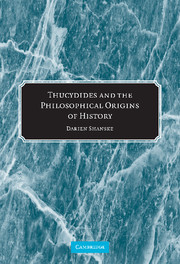Book contents
- Frontmatter
- Contents
- Acknowledgments
- Introduction
- 1 Thucydides's Vision
- 2 The Case of Pericles
- 3 Deinon, Logos, and the Tragic Question Concerning the Human
- 4 Thucydidean Temporality
- Appendix I Restoring Key Terms 1.1–1.23
- Appendix II Pretragic History of Deinon
- Appendix III Wittgenstein on Fly-Bottles, Aspect Seeing, and History
- Appendix IV Heidegger on World and Originary Temporality
- Notes
- Bibliography
- Index
Appendix III - Wittgenstein on Fly-Bottles, Aspect Seeing, and History
Published online by Cambridge University Press: 19 August 2009
- Frontmatter
- Contents
- Acknowledgments
- Introduction
- 1 Thucydides's Vision
- 2 The Case of Pericles
- 3 Deinon, Logos, and the Tragic Question Concerning the Human
- 4 Thucydidean Temporality
- Appendix I Restoring Key Terms 1.1–1.23
- Appendix II Pretragic History of Deinon
- Appendix III Wittgenstein on Fly-Bottles, Aspect Seeing, and History
- Appendix IV Heidegger on World and Originary Temporality
- Notes
- Bibliography
- Index
Summary
Introduction
This book would have been unduly cumbersome if it spent too much time on the underlying philosophical arguments as the main argument about Thucydides's text proceeded. This was actually more than a logistical hurdle, as there seems to be no reason to delve into the finer points of aspect seeing and world creation if it were not first established that these are important to understanding Thucydides's text. And so, I began with some provisional philosophical arguments, sketches really, and postponed more detailed discussion to the appendixes. Of course, the appendixes can hardly do justice to the philosophical positions I am relying upon, but, as in my discussion of the deinon in tragedy, I do hope that the discussions that follow at least move my position out of the domain of mere hand waving and place them in the context of an important tradition. This appendix will address my debt to Wittgenstein, especially as regards aspect seeing and history.
It should be noted at the outset that Ludwig Wittgenstein published only one book, the Tractatus Logico-Philosophicus, with which he was later dissatisfied. Parts of a second work, the Philosophical Investigations, were apparently getting close to being presentable to his mind, but the work was not published in Wittgenstein's lifetime. Thus all of the many works of Wittgenstein other than the Tractatus are collaborative efforts between Wittgenstein and his editors – generally former students.
- Type
- Chapter
- Information
- Thucydides and the Philosophical Origins of History , pp. 177 - 184Publisher: Cambridge University PressPrint publication year: 2006



